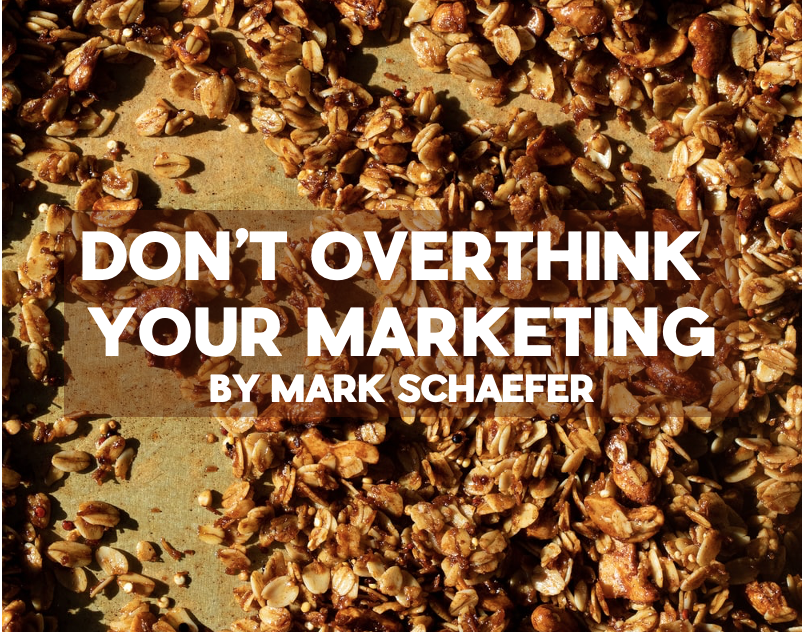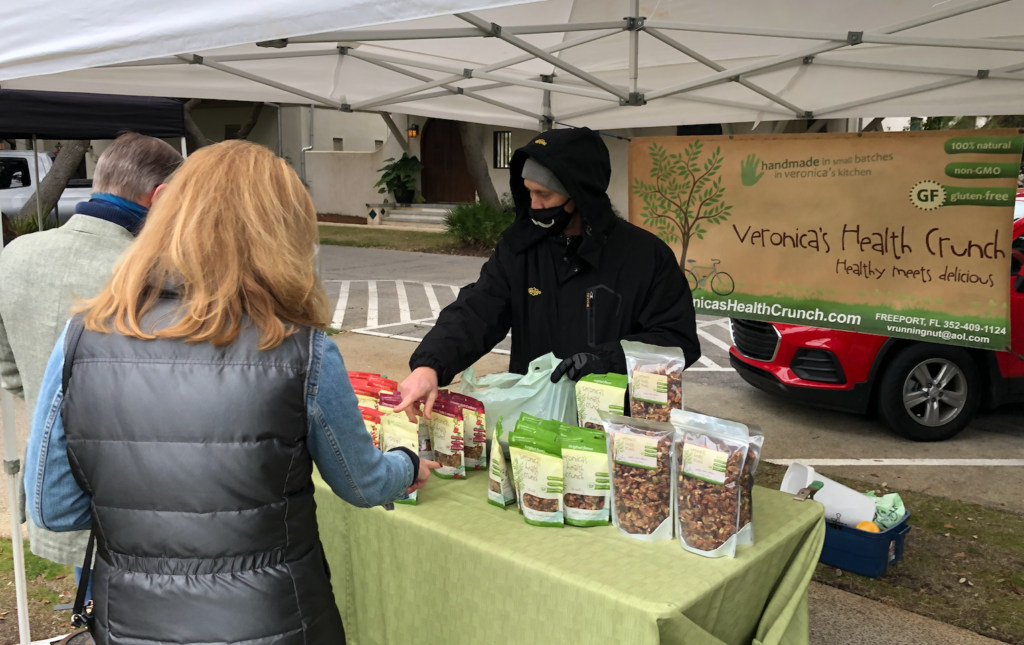
I recently had an experience that reminded me of how we often overthink marketing. I observed our marketing discipline in a refreshingly simple form and wanted to share it with you.
I took some time off in Florida recently and spent a sleepy Saturday morning at an outdoor farmer’s market. This wasn’t your typical market filled with produce — it was around the town square of an extremely wealthy enclave of homes. Remember … I was VISITING! This was way out of my league.
My wife became preoccupied with some jewelry, and I was bored, so I started a conversation with a fellow selling granola — Veronica’s Health Crunch. The guy was actually Veronica’s brother. It was pretty cold at the time. It looked like this:

He told me how the healthful and delicious product started, how it’s made, and how it has taken off like a rocket. The little family business is now shipping its granola to big supermarket chains like Whole Foods and Wegmans.
But something didn’t make sense to me.
If this business was growing like crazy and already found their big supermarket chain customers, why did this company leader haul himself out of bed on a Saturday morning and stand at a freezing cold, open-air stand in the middle of a pandemic?
What was I missing?
Don’t overthink marketing
So … I asked him.
“If you’re already in a big chain like Whole Foods, why are you standing out here in the cold?” I asked.
“How do you think I got into Whole Foods?” he replied. “If you hang out with rich people, it opens up all kinds of new doors.”
Pretty smart.
There are fundamental lessons here to fight against a tendency to overthink marketing at every turn!
1. Where is the customer island?
One of my favorite parts of the Marketing Rebellion book is an idea I provided about finding your customer “islands.” Where are your customers hanging out? Go there!
Too often we obsess about using digital techniques to DRAG customers to our website or social media accounts. But it’s so much easier to show up where they are already have an established community — in real life or on the web — and just be a helpful, friendly human being in that environment.
Sometimes we can’t see past our digital world to think about other possibilities. Veronica’s shows up at farmer markets in rich enclaves all over the Southeast. It’s not a cheap product so they’re looking for wealthy people who like healthy snack food. Why not a farmer’s market? That’s the island!
2. The power of sampling
Giving out free samples is one of the oldest and most reliable marketing techniques, especially if the product is pricey — a large bag of the stuff was about $28! Sampling possibilities are limited in a pandemic, but connecting with people outside is a possibility in some places. And of course, we’ll be back to normal some day soon!
You’re much more likely to sell a product if people can try it on the spot.
But this is especially powerful when you combine it with …
3. Telling the story
If I had just visited his granola tent without hearing his interesting story, I never would be writing this post today and sharing it with you.
Never just give out samples. Tell stories. If you give your product away, you’ll just attract people who want free stuff. But if you use every single interaction as an opportunity to tell a story that is RITE (Relevant, Interesting, Timely, and Entertaining), eventually people will share your story with others.
About 10 percent of the population are natural super-sharers (I covered this concept in my Return On Influence book). These folks simply love spreading the word about new ideas and special “finds” with everybody they meet.
I visited lots of tents that day. The best artisans knew how to tell their RITE story to turn a walk-by into a conversation. And we usually bought something.
Never give away a sample without telling a story.
So, yes it was cold. But I got a good story and some great lessons out of that little tent. Not to mention some absolutely delicious granola!
Don’t over-think your marketing and don’t become preoccupied with social media as the only available solution. You need to connect with customers and create demand and there are lots of creative options to do that.
 Mark Schaefer is the executive director of Schaefer Marketing Solutions. He is the author of several best-selling digital marketing books and is an acclaimed keynote speaker, college educator, and business consultant. The Marketing Companion podcast is among the top business podcasts in the world. Contact Mark to have him speak to your company event or conference soon.
Mark Schaefer is the executive director of Schaefer Marketing Solutions. He is the author of several best-selling digital marketing books and is an acclaimed keynote speaker, college educator, and business consultant. The Marketing Companion podcast is among the top business podcasts in the world. Contact Mark to have him speak to your company event or conference soon.


